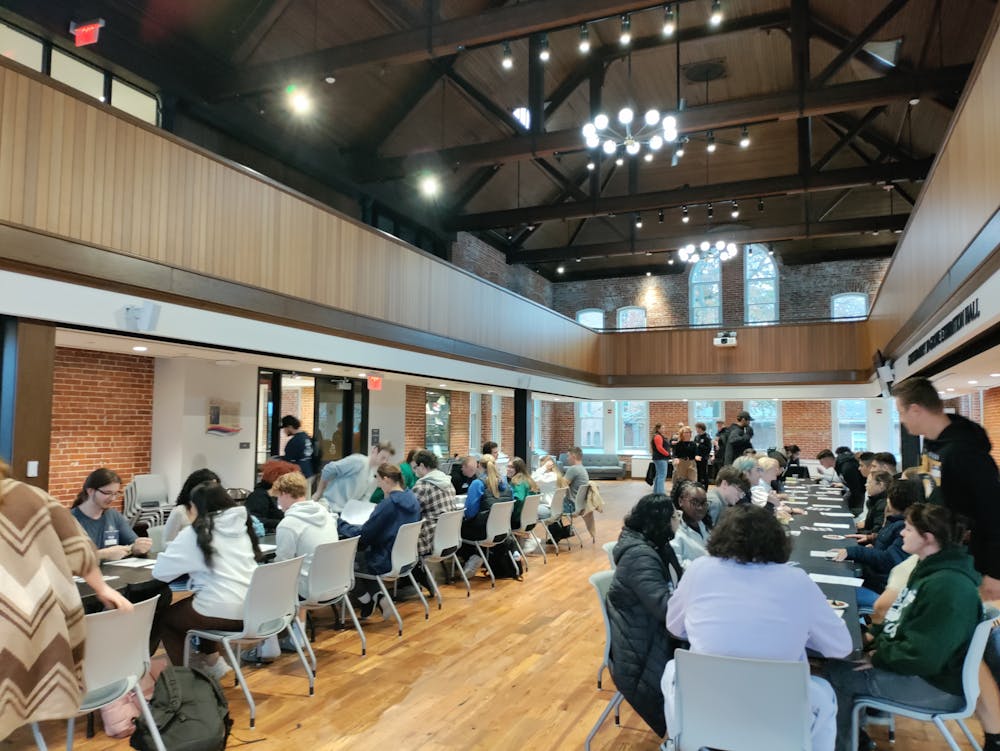For one hour on Wednesday, Oct. 29, Shippensburg University students found that their colleagues listen to the same music and stream the same shows as they do, regardless of who they supported for president in the 2024 election.
Political Science professor Alison Dagnes hosted her annual Political Speed Dating night at 5 p.m. in Stewart Hall. In attendance was a large gathering of students from various backgrounds who were eager to reach out across the political aisle.
Dagnes began by introducing students to the concept behind political speed dating. Over the years that she has held the event, her goal has been to get students out of their rooms and interacting with others they would not otherwise communicate with.
Students were asked to take a seat on either side of a long row of tables depending on if they consider themselves right-leaning or left-leaning. Whoever they sat across from was their partner for that round. Students introduced themselves and then politely discussed the political issues that mattered most to them.
The goal for each round was for the two participants to find something they both have common ground on. This could include anything ranging from what movies they like to watch to what they like to put on their morning toast.
When each five-minute round ended, students were encouraged to end on an upbeat note, with Dagnes hoping that they would each make a new friend through Wednesday’s event. Students then moved two seats to the right to meet someone new and start again.
Junior Political Science major Aidan Garcia was one of many attendees who learned something new about their fellow students across the aisle.
“We do have a lot of things in common. Some of the guys I was talking to, we share the same hobbies,” said Garcia. “Outside of politics, there are a lot more similarities than I would have guessed.”
Many are concerned that American society will continue to grow more polarized, but Garcia believes that more young people will embrace honest discussions with the other side.
“I do think that there’s hope. I think it will take a little bit to get there … it’s been on an incline for quite a while,” he said.
As Dagnes has led Political Speed Dating nights annually for the past few years, she has seen how students respond to politics make drastic changes.
“Two things have changed in the last two years, dramatically. One is that we have become much more polarized. People feel very comfortable saying that they hate people on the other side,” she said. “The other thing is that students have become much more anxious, and that is a toxic combination … I had three students just now say, ‘I was so nervous about this, but it was so much fun.’”
According to Dagnes, the goal is to achieve what she called “cross-cutting cleavages.” The term refers to finding common ground on one shared interest, which can transcend political boundaries.
“That’s the kind of thing we need to do more of. We need to get people into more clubs where the thing you all have in common is that you like Dungeons and Dragons, and that it doesn’t really matter who you voted for,” she said.
Speaking on student political anxiety, for many young people, there is a concern at the harm the other side may cause on them. “The only thing that really matters is that people de-escalate, and they realize ‘Okay, I sat across from Evan, and he didn’t try to hurt me. Maybe what I am hearing is wrong,’” she said.
For students who are interested in meeting more people with different political opinions, Dagnes encouraged them to join more clubs on campus.
“Get out of your dorm room, get off of your phone, go meet people and talk to people,” Dagnes said.





The Slate welcomes thoughtful discussion on all of our stories, but please keep comments civil and on-topic. Read our full guidelines here.